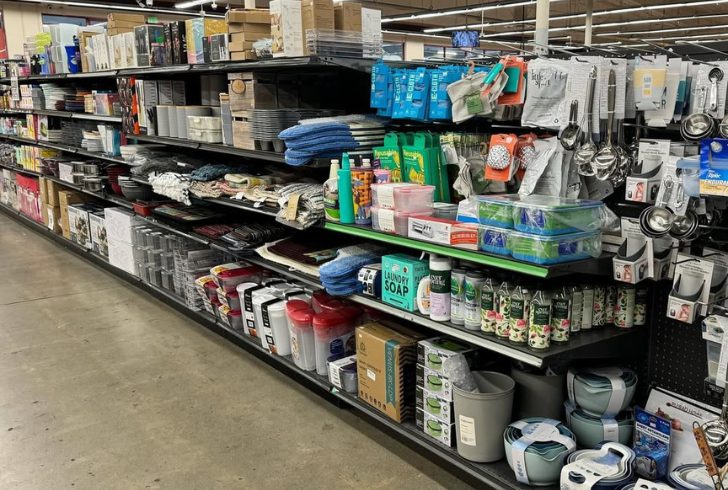A sweeping tariff crackdown may soon disrupt daily shopping across the country. Recent decisions from former President Donald Trump have triggered a chain reaction across the global supply network. As a result, store shelves may begin to look surprisingly empty in the coming weeks.
With a sharp increase in import taxes—some reaching as high as 145%—many U.S. companies are pulling back on shipments from major trading partners, especially China. Major retailers like Target, Walmart, and Home Depot have already voiced concerns.
According to reports, these companies warned that shoppers will likely face limited options and higher prices if current tariff strategies remain unchanged.
Fast Fashion Faces Immediate Impact
Apparel may be one of the first areas hit. Fast fashion brands like Temu and Shein have relied on a tariff exemption known as “de minimis” to ship low-cost items directly to customers. This policy allowed buyers to spend up to $800 per day without triggering additional import taxes.

Instagram | @environment | Temu and Shein face changes as the U.S. ends fast fashion tax break.
Now, that exemption is ending. On May 2, a new executive order shuts that window for overseas retailers. Supply chain experts predict a noticeable reduction in both the variety and quantity of fast fashion items in U.S. markets. That means consumers may find fewer color choices, sizes, and designs on store racks.
Fourth of July Favorites May Be Harder to Find
Independence Day typically brings a surge in seasonal purchases—flags, fireworks, and grilling gear top the list. Many of these goods come directly from Chinese factories. According to experts, alternative sources for these products don’t exist in large numbers.
With the supply chain tightening, Americans might encounter higher prices or missing stock just in time for the July holiday rush. From party decorations to outdoor furniture, the selection could shrink quickly.
Back-To-School Season Could Be Disrupted
Summer usually marks a busy season for parents stocking up on school essentials. Pencils, notebooks, backpacks, and tech accessories often take weeks to manufacture and ship. Delays in production, paired with rising import fees, could cause uneven availability.
Retailers may carry fewer styles or brands this year. For instance, if your child wants a specific color backpack, options may run thin. Factories tend to produce one design at a time, switch tooling, and then rotate through styles—this delay, coupled with new tariffs, creates gaps in availability.
Home Furnishings and Decor May Also Vanish
Patio chairs, indoor lighting, and budget-friendly wall decor could disappear from store shelves faster than expected. These items, while not considered essential, make up a significant portion of home improvement and seasonal retail.
Because many of these products are built in China and sold at thin profit margins, retailers may struggle to restock them at a reasonable price. Expect delays or price spikes, especially during peak shopping times like summer.
Toy Supply Chains Struggle to Adjust
Approximately 80% of toys sold in the U.S. are produced by Chinese manufacturers. Small to mid-sized American toy brands have sounded alarms about potential collapse if tariffs remain this high. According to a recent industry survey, nearly half of these companies risk shutting down within weeks.
Toys for holidays and birthdays may become harder to find, and when available, they could carry higher prices. Even Trump acknowledged this issue publicly, stating that children might need to settle for fewer options.
Everyday Essentials May Be Next

Instagram | @thediscountstoreca | Everyday essentials may disappear as costs rise.
Plastic cutlery, paper plates, batteries, and soap often stock store shelves in corner shops and dollar stores. These low-cost goods usually operate with minimal profit margins. Because of their price sensitivity, even small cost increases make a big difference.
Shipments of these essentials may slow or stop altogether. Supply chain professionals warn that many of these items, though basic, are most vulnerable to sudden changes in cost and availability.
Electronics Could See the Biggest Changes
Consumer electronics depend heavily on overseas production. Items like smartphones, tablets, and Bluetooth devices include components made almost exclusively in China. Retailers may need to raise prices across product categories to absorb the impact of tariffs.
Even high-end products like Apple phones could become harder to afford. Stock might last through the early months of summer, but as new inventory dries up, cost adjustments will likely follow.
Appliance Parts May Quietly Disappear
While not flashy, replacement parts for home appliances keep everyday life running smoothly. Light bulbs, refrigerator filters, cords, and grill accessories often arrive in bulk from overseas suppliers.
These items usually aren’t reordered until supplies run low. Because of the impact of tariffs on that reordering cycle, shortages may surprise individuals. For those trying to repair instead of replace, the wait may stretch longer than expected.
What To Expect As Summer Continues
Major retailers still have limited stock purchased before the latest policy shifts. However, that inventory won’t last indefinitely. Experts expect shoppers to notice real changes by early to mid-summer. Some items may become hard to find, while others could carry price tags that feel surprisingly steep.
As Casey Armstrong of ShipBob explains, “First, things like toys will vanish. Then, your favorite apparel items. And then, maybe some of the weird replacement parts that you didn’t know came from China.” He adds that shortages won’t hit all at once but will happen gradually. That “slow bleed” is already underway.
Consumers may not notice the changes immediately, but shelves will start to thin. Now is the time to stock up wisely, budget carefully, and prepare for shifts ahead.


